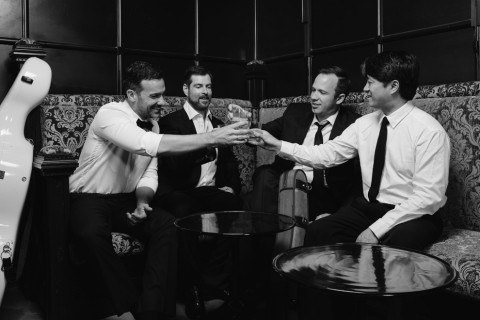

Press

Review: Miró Quartet opens chamber music festival with exceptional ease
By: Alan G. Artner
All-Viennese programs are commonplace at concerts occurring near the turn of the year. But this time a different sort of commonplace – half Viennese, half German – gave some of the deepest satisfaction of the season, as Northwestern University’s Winter Chamber Music Festival began a six-concert run at Pick-Staiger Concert Hall in Evanston.
The Miró Quartet and guest pianist Shai Wosner opened the series with a Mozart-Beethoven-Brahms program that could not have been more conventional. The level of playing, however, set the evening apart with a degree of naturalness and apparent ease that really was exceptional.
Many of the players who appear at Pick-Staiger are frequent visitors who nonetheless have not come to terms with the hall’s bright acoustic that throws off the range of soft to loud, forcing artists to exert extra effort in achieving quieter shadings. If they achieve them at all – and most do not – listeners feel the effort as much as the result.
By contrast, the Miró and Wosner played everything with a sense of effortlessness that observed the finest distinctions in tempo and dynamics yet showed not a whit of strain. As their Mozart (the Second Piano Quartet, K. 493) had no artificial prettification, their Beethoven (Quartet No. 6, Op. 18, No. 6) and Brahms (Piano Quintet, Op. 34) did not italicize quirkiness or force a tone of tragedy that lies just beneath the surface.
Expression was not, then, a matter of holding back in the Mozart or pushing progressively harder in the Beethoven and Brahms. Instead, the sound produced by the Miro and Wosner always was rounded and full, without audible pressure. This may suggest the semi-detached lukewarm atmosphere created by many young players. But there was here heat as well as light, just little anxiety or stridency.
The whole of the Mozart unfolded artlessly enough to make me wish all repeats had been taken. The last movement of the Beethoven showed his formal daring without neurotic tension. The faster movements of the Brahms had an intrepid quality that registered most passionately in the agitated closing pages.
The single encore was the third movement of Antonin Dvorak’s Second Piano Quintet, a Furiant played with folk-ish robustness rather than fury.
Please click here to read the review in its entirety.